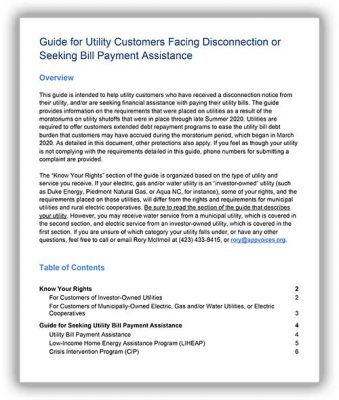Over the past year, hundreds of thousands of households in North Carolina have fallen behind on their electric, gas and/or water bills as a result of the pandemic and economic crisis. At the end of November, more than 650,000 households were past due on their bills, owing nearly $150 million.
Unfortunately, the shutoff moratorium instituted last year by Governor Roy Cooper and the N.C. Utilities Commission have long since expired, leaving households vulnerable to losing critical services like water and power as the crisis rages on. Despite the best intentions of the governor and NCUC when they allowed their moratoriums to expire, tens of thousands of utility shutoffs have already occurred in recent months.
But there is still some good news. Both the governor’s and utilities commission’s orders instituted some requirements that utilities must follow to help households keep their power on and their water running services until the crisis is over.
We have put together a detailed guide to help you “Know Your Rights” as a utility customer, especially if you are facing disconnection because you cannot pay your bill. Below we have listed a few of the most important takeaways, but we strongly encourage that you read through the full guide as the protections and requirements differ a bit depending whether your utility was covered by the governor’s moratorium or the NCUC moratorium:
- Utilities are required to offer extended debt repayment plans over a minimum of 6 or 12 months, depending on the utility.
- Utilities cannot charge interest or late fees on debt accrued during the moratorium period, but can charge fees for returned checks and credit card payments.
- Utilities must have already reasonably informed customers of the protections and repayment options through print, email, text message, online, and/or direct phone calls.
Our guide also provides an overview of available programs that offer help in paying your bill, which include utility programs (check with your utility to see if such assistance is available), and the Low-Income Home Energy Assistance Program and Crisis Intervention Program, both of which are offered through your local Department of Social Services or by calling 2-1-1. Regardless of whether funding is currently available, be sure to apply anyway so that you can get on the list for help when more funding comes through.
The recent federal COVID relief bill has also created an assistance fund for water and wastewater bills, but those funds are not yet available. We will update the guide when it is.
Finally, in the guide you can find contact information for the NC Utilities Commission’s Consumer Services Division or the Attorney General’s office to submit a complaint if you feel your utility is violating your rights as a customer.
If you have any questions, please reach out to Rory McIlmoil at (423) 433-9415, or by emailing rory@appvoices.org. We’re here to help.




Leave a Reply